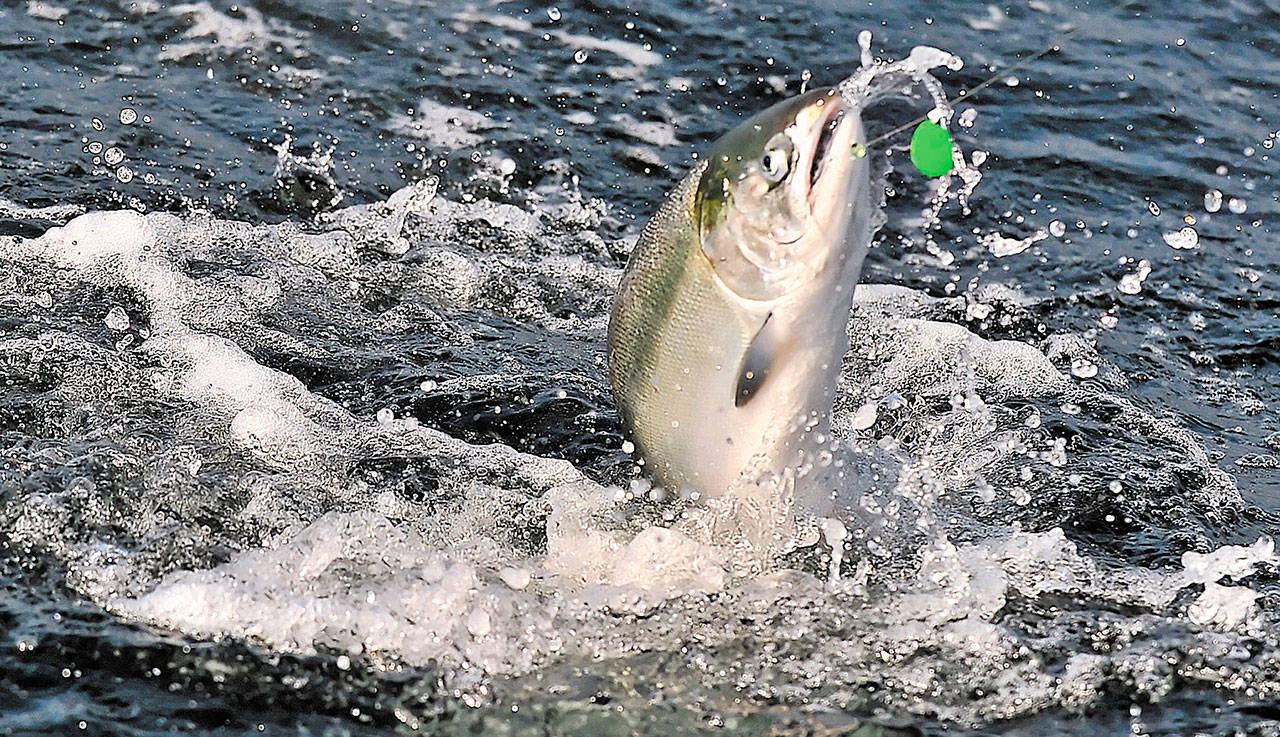By Gillian Flaccus
The Associated Press
PORTLAND, Ore. — Canada and the U.S. states of Alaska, Oregon and Washington would all reduce their catch of fragile salmon species under the terms of an updated international agreement that, if approved, will spell out the next decade of cooperation between the U.S. and Canada to keep the migratory fish afloat in Pacific waters.
Members of the Pacific Salmon Commission on Monday recommended a conservation plan that stretches to 2028 after two years of intense negotiations involving fishermen, tribes on both sides of the border and state and federal officials. It must be approved by both the U.S. and Canadian governments.
The international commission first met in 1985 to create more cooperation between Canada and the U.S. on protecting salmon, which migrate thousands of miles from inland streams to the Pacific Ocean and then back to their spawning place. The agreement covers pink, coho, sockeye, chum and chinook salmon and spans a territory from Cape Falcon, Ore., in the south to southeast Alaska in the north. The current agreement expires Dec. 31.
One of the most significant parts of the new treaty is reductions in the allowed harvest of chinook salmon, and particularly of chinook populations that are listed under the U.S. Endangered Species Act, the Oregon Department of Fish and Wildlife said.
That includes chinook stocks from the Puget Sound in Washington and the Columbia River basin that straddles Oregon and Washington.
These salmon migrate north hundreds of miles to British Columbia and southeast Alaska, making it important to protect their numbers all along the journey, commission members agreed.
Southern resident orcas in the Puget Sound, which rely on chinook as a primary food source, have struggled recently because so few salmon are making it to the Pacific Ocean.
Alaska will reduce its catch by 7.5 percent in the southeast when poor chinook returns are expected. Canada will do so by 12.5 percent and Oregon and Washington will reduce their catch anywhere from 5 percent to 15 percent, according to the Alaska Department of Fish and Game.
Alaska Gov. Bill Walker said he had asked U.S. federal officials to consider a one-year delay in implementing a revised treaty because some fishing groups were unhappy with the proposal to reduce the harvest. That was not possible, he wrote in a statement.
“I regret the reduction of even one salmon available to Alaskans for harvest,” he said. “However, this treaty agreement protects the health and sustainability of our salmon stocks and guarantees Alaska’s ability to directly manage our fisheries without federal interference.”
The updated treaty was announced a few days after Washington state authorities took the highly unusual step of closing salmon fishing on a section of the main stem of the Columbia River. The count of fall chinook at Bonneville Dam last week was 105,795 fish, about half of what is normal.
The fall chinook count at Bonneville Dam hovers around 29 percent below the preseason forecast.
Funding requests to implement the treaty will include money for the Puget Sound chinook fishery and to support recovery efforts for the orcas that live in the Puget Sound.
Their plight has received international attention recently as marine biologists tracked and tried to treat an emaciated and sick female orca who was later presumed dead. Another female from the same pod spent weeks carrying her newborn calf on her nose after it died shortly after birth, eliciting worldwide sympathy.

